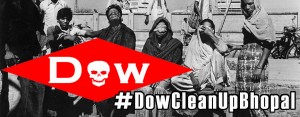Hindustan Times reports that the Union Carbide Corporation (UCC) has requested an early hearing of the Delhi Supreme Court’s ‘Curative Petition’. The petition aims to address inadequacies within the 1989 civil settlement of the Bhopal Disaster (U.S. $470 million) and Dow Chemical is also a named respondent.
The Indian Government’s official position is that the ‘gross inadequacy’ of the 1989 settlement (with UCC- prior to the Dow Chemical takeover) resulted in an ‘irremediable injustice’. It is seeking additional compensation based on higher figures for the dead and injured. The Bhopal survivors groups have challenged the Government to use its own, previously published, figures (Indian Council of Medical Research, epidemiological report, 2004) for the dead and injured which would require a settlement of $8.1billion.
UCC claimed that social activists were:
“using pendency of the proceedings to besmirch the company’s reputation on the basis of unsubstantial allegations… The company has been subjected to an unprecedented and heightened media campaign by certain interest groups. This campaign was laden with false information and insinuations,” in its latest plea, also stating that activists blame the company for not bringing a closure to the Bhopal matter.
Activists are correct to blame UCC for not bringing closure to Bhopal for a number of reasons, amongst them being the fact that UCC has NEVER answered the criminal charges outstanding against it, and has never bothered to clear up the thousands of tonnes of toxic chemical waste abandoned, on and around the Bhopal factory site, and still poisoning the local population to this day.
It is worth noting that it is Union Carbide requesting the hearing be quickly expedited, and claiming to be the subject of an unfair media campaign when, in fact, the campaigners and activists have very serious and justifiable grievances- not least the matter of the non-attendance at the criminal courts- and, in the main, target Union Carbide’s owner Dow Chemical.
Dow Chemical clearly wishes not to be associated with the case but may struggle with maintaining its distance. Dow was summonsed, in November 2014, requiring it attend court and explain why UCC has repeatedly ignored court summons. Dow did not attend the court and was subsequently summonsed to appear on March 13, 2015 but, once again, did not attend.
Audrey Gaughran, Amnesty International’s Director for Global Issues, said: “The time has come for Dow to appear in an Indian court and account for the failure of its wholly-owned subsidiary, Union Carbide, to respond to the criminal charges against it.”



